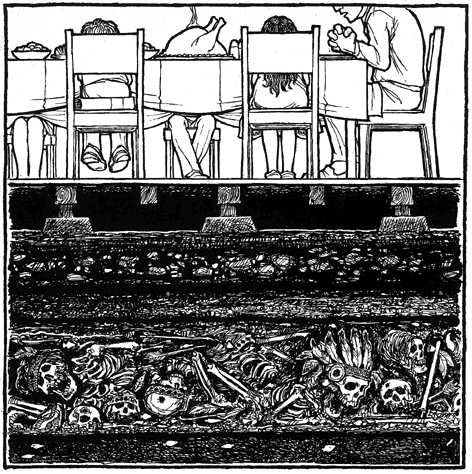The book retells the story of the Pilgrims' arrival in what is now Plymouth, Mass., in November 1620 in a way that suggests God's hidden hand protected these devout people again and again from extinction.
"But four years prior to the Pilgrims' arrival, a mysterious plague had broken out among them, killing every man, woman and child. So complete was the devastation that the neighboring tribes had shunned the area, convinced that some supernatural spirit had destroyed the Patuxets," Mr. Marshall and Mr. Manuel wrote. "Hence, the cleared land on which [the Pilgrims] had settled literally belonged to no one."
No mystery about it
Even talking about a "mysterious plague" is disingenuous. I don't think there was anything mysterious about it. Here's how it came about:
Nauset History
Although the Nauset would usually abandon their villages and retreat inland at the approach of a European ship, they continued to be victimized by sailors of all nationalities. In 1614 Captain Thomas Hunt captured seven Nauset and twenty Patuxet (one of whom was Squanto who later gained fame as a friend of the Pilgrims in Plymouth) and later sold them as slaves in Spain. Kidnapping and enslaving 27 of their people was a minor offense compared to the other thing Thomas Hunt did to the New England Algonquin. It appears there was a terrible sickness among Hunt's crew that was inadvertently passed to the Nauset and Wampanoag in the course of his raid. Spreading quickly through the native population in three waves, it killed 75% of the original residents of New England and the Canadian maritimes between 1614 and 1617.
Hence my argument that Europeans were responsible for the deaths caused by disease even when they didn't "intend" for the Indians to die. The fact is that they were going to kill, enslave, or decimate the Indians any way they could. Diseases merely made the work of genocide go faster than it would've otherwise.


2 comments:
"But four years prior to the Pilgrims' arrival, a mysterious plague had broken out among them, killing every man, woman and child"
So much for a certain former frequent commenter's claim that pre-Columbian America was free of disease.
Gen: Good point. Then the plague could have been the result of some Old World disease traveling north?
Post a Comment